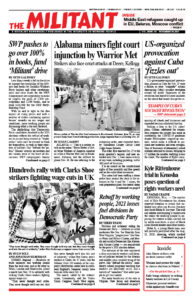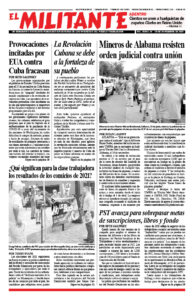ATLANTA — “He was trapped like a rat,” Gregory McMichael, one of three defendants on trial for the vigilante-style killing of Ahmaud Arbery, told investigators just hours after the Black youth had been cornered and shot dead on Feb. 23, 2020, in the Satilla neighborhood near Brunswick, Georgia.
Twenty-five-year-old Arbery was chased and gunned down by Travis McMichael and his father Gregory, a retired Glynn County cop and former investigator in the local prosecutor’s office. They were joined in the fatal assault by William Bryan, a neighbor who captured the killing on his cellphone. When the video was leaked May 18, a two-month-plus effort by cops and prosecutors to cover up the killing and prevent charges exploded. New prosecutors were assigned and the three arrested.
Their trial began Nov. 5. It has been marked by efforts of the defense attorneys to try and introduce race into the proceedings. During jury selection defense attorneys complained that the jury pool didn’t have enough “white males, over 40, born in the South, who do not have a college degree.”
In fact defense attorneys used their allotted “strikes” to prevent all but one Black from getting on the jury. Judge Timothy Walmsley noted this looked like “intentional discrimination,” but seated the jury, saying the defense had given nondiscriminatory reasons for each strike and Georgia law limited his ability to intervene.
Kevin Gough, defense attorney for one of the three men, apologized in court Nov. 12 for remarks he made the day before, protesting the attendance at the trial by Rev. Al Sharpton and other prominent African Americans who were sitting with the Arbery family. “We don’t want any more Black pastors coming in here,” he told the judge, who cut Gough off after he said, “If a bunch of folks came in here dressed like Colonel Sanders with white masks sitting in the back, that would be —.”
Defense attorney Jason Sheffield, who is representing Travis McMichael, distanced his client from Gough’s call to bar Black religious figures from the courtroom.
“My apologies to anyone who might’ve been inadvertently offended,” Gough said.
But when the trial resumed Nov. 15, all three defense attorneys asked the judge for a mistrial. Objecting to the presence of Rev. Jesse Jackson, who was sitting with Arbery’s mother, Gough said, “I guess the next question is, ‘Which pastor is next?’” The judge denied the motion to bar Black religious figures. A contingent of Jewish clergy will join clergy from different faiths outside the courthouse Nov. 18 to protest Gough’s remarks.
The defendants pleaded not guilty to charges of malice and felony murder. They also face separate federal hate crime charges. Defense attorneys say their clients believed Arbery had committed burglaries in the neighborhood and acted legally in killing him under the state’s citizen’s arrest law, which was in place at the time. One result of the broad outrage over the killing is that the law was repealed earlier this year.
Trial testimony begins
Matthew Albenze, who lives in the Satilla neighborhood, told the court he saw Arbery enter a construction site on the day he was killed and called a police nonemergency number to report it. Asked by the prosecutor why he called the nonemergency number rather than 911, Albenze said, “I did not see an emergency.” Security cameras on the site showed Arbery stopped there, but didn’t take anything.
Larry English, the owner of the home under construction, testified he had shared with cops and neighbors security camera recordings of a Black man and others entering his property. He wanted police to identify those in the video and tell them to stay off the property. Following the shooting English said Arbery had likely stopped at the house for water.
On Feb. 11, 2020, Glynn County cop Robert Rash showed the McMichaels security camera video. Rash sent a text to English suggesting he reach out to Gregory McMichael for help if people continued to enter the property.
From the moment cops arrived at the scene of the shooting, they treated the McMichaels and Bryan like one of their own, accepting their version of what happened without question.
The killing led to protests in Brunswick, where Arbery lived, and across the country, demanding action. It took 74 days, and a number of changes in prosecutors, before charges were brought, following the leak of Bryan’s video of the killing.
Efforts by defense attorneys to minimize public attention to the trial began soon afterwards. The judge denied defense motions to bar the press from the courtroom and to bar protests by Arbery family supporters outside the court.


